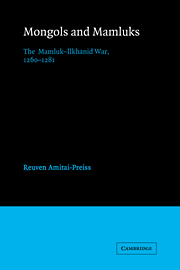Book contents
- Frontmatter
- Contents
- List of illustrations
- Preface
- List of abbreviations
- Notes on dates and transliteration
- Introduction
- 1 The historical background
- 2 The battle of ʿAyn Jālūt
- 3 The formulation of anti-Īlkhānid policy
- 4 The search for a second front
- 5 Military and diplomatic skirmishing
- 6 The secret war
- 7 Baybars's intervention in Seljuq Rūm
- 8 Baybars's posthumous victory: the second battle of Homs (680/1281)
- 9 The Mamluk–Īlkhānid frontier
- 10 Mamluks and Mongols: an overview
- Maps
- Genealogical Tables
- Glossary
- Bibliography
- Index
6 - The secret war
Published online by Cambridge University Press: 23 November 2009
- Frontmatter
- Contents
- List of illustrations
- Preface
- List of abbreviations
- Notes on dates and transliteration
- Introduction
- 1 The historical background
- 2 The battle of ʿAyn Jālūt
- 3 The formulation of anti-Īlkhānid policy
- 4 The search for a second front
- 5 Military and diplomatic skirmishing
- 6 The secret war
- 7 Baybars's intervention in Seljuq Rūm
- 8 Baybars's posthumous victory: the second battle of Homs (680/1281)
- 9 The Mamluk–Īlkhānid frontier
- 10 Mamluks and Mongols: an overview
- Maps
- Genealogical Tables
- Glossary
- Bibliography
- Index
Summary
The Sultans of the Saracens had many spies, who desired to know all of the deeds of the Christians, not only in nearby regions, but also in remote regions.
Fidenzio de PaduaIn order to combat better the Mongol danger, Baybars established an intelligence service, which was based on secret operatives and informants in enemy territory. The information thus obtained was vital for the timely adoption of proper measures for the defence of the Sultanate. Baybars, however, did not stop at the mere gathering of information, but initiated assorted covert activities to weaken the Mongols, including assassination, disinformation to discredit opponents, and the cultivation of contacts with indigenous Muslim princes, officers and officials in the Īlkhānid state. This was in addition to the activities described in previous chapters which could also be placed under the rubric of “secret war,” such as the raids across the border, the burning of grasslands and the dispatch of Muslim rulers to reestablish their “kingdoms” (the Caliph al-Mustanṣir, al-Ṣāliḥ of Mosul and the “lord” of Irbil). Baybars's successors continued these activities until the end of the Mamluk–Īlkhānid war in 720/1320 and even after. As is to be expected, the sultans also used espionage and subterfuge against the Franks in Syria.
The Īlkhāns also tried their hand at both espionage and “dirty tricks.” In general, however, their efforts were not crowned with success, at least, according to the Mamluk sources, who probably only knew of such Mongol activities when they failed or those involved were caught.
- Type
- Chapter
- Information
- Mongols and MamluksThe Mamluk-Ilkhanid War, 1260–1281, pp. 139 - 156Publisher: Cambridge University PressPrint publication year: 1995

